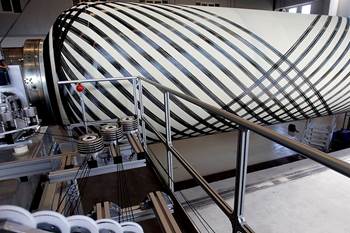Search Results
Showing 131 – 140 of 1103 results
Composite materials are engineered combinations of two or more distinct materials, merging their individual properties to create a new material with enhanced characteristics. Typically composed of a reinforcing phase (like fibers or particles) embedded within a matrix (often a polymer, metal, or ceramic), composites leverage the strengths of each component to achieve superior strength, stiffness, lightness, or other desirable attributes. Their versatility extends across industries, from aerospace and automotive to construction and sports equipment, where their tailored design and exceptional properties offer solutions for high-performance applications.
Recycling in composites manufacturing is an evolving endeavor aimed at addressing sustainability challenges. Unlike traditional materials, composites often pose recycling complexities due to their multi-component nature. However, innovative techniques are emerging to tackle this issue. Methods like pyrolysis, mechanical recycling, and chemical processes are being developed to efficiently recover valuable components from composite waste, such as fibers or matrix materials.
New business structure will incorporate Fuji Design’s proprietary, low environmental impact “precision pyrolysis” technology to produce high-quality carbon fiber from used CFRP for commercialization.
Ultra-lightweight and made of recycled composites, the Eco Bracket cuts weight and cost in half and reduces CO2 emissions, in addition to providing high performance.
Large-format AM specialist Caracol and partners designed custom, 3D-printed outdoor furniture with glass fiber-reinforced recycled polypropylene, and conducted an LCA to evaluate and improve the process.
Regen Fiber’s sustainable recycling process keeps wind blades out of landfills by converting them into raw materials for use in asphalt, composite products and more.
Voith Composites and partners develop recycling solutions for hydrogen storage tanks and manufacturing methods to produce automotive parts from the recycled materials.
Carbon fiber LCA methods, improving material carbon footprint and overall lightweighting opportunities for customers are just a few ways in which the Teijin Group expects to meet its 30% emissions reduction target.
Asahi Kasei and Microwave Chemical collaborate to commercialize a more sustainable manufacturing process to recycle PA66 using PlaWave microwave technology, and eventually also recycle polymers with fiber reinforcement.
Delivery of the single-spindle robotic setup with an ATP head will advance the R&D organization’s work in CUBIC, GENEX and Carbo4power initiatives targeting sustainable composites development.
Skeptics say it won’t work — Osaka-based Microwave Chemical Co. says it already has — and continues to advance its simulation-based technology to slash energy use and emissions in manufacturing.
With the involvement of two schools from the Institut Mines-Télécom, the 4-year project aims to improve the intrinsic properties of a composite material based on Elium via four concrete demonstrators.










